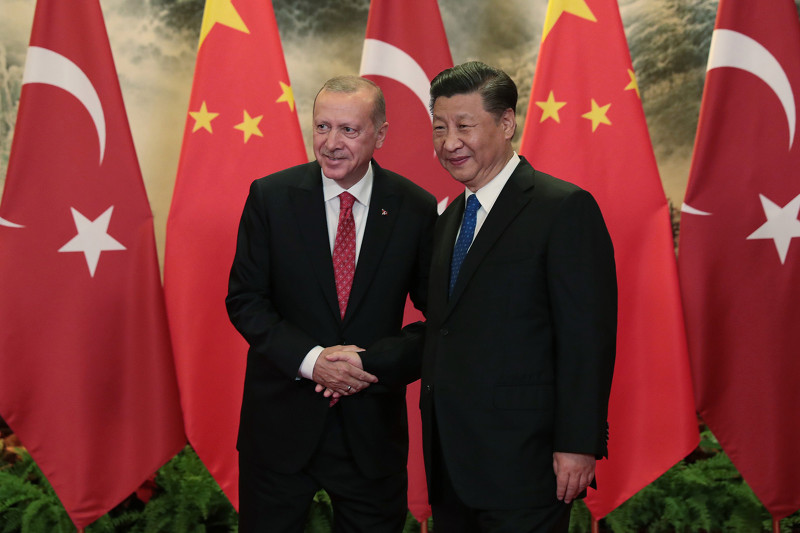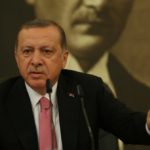ISTANBUL – The fate of tens of thousands of Uighur refugees in Turkey faced with possible deportation to China is threatening to become an embarrassing political debacle for Turkish President Recep Tayyip Erdogan, who has long positioned himself as an avowed defender of Muslim rights globally.
“They tell you that they’re the biggest [defenders of] Muslims, but they fail to hear the cries of our brothers and sisters who are tortured for saying they’re Muslim Turks,” said Meral Aksener of Turkey’s center-right Good Party in a speech Wednesday to her parliamentary deputies bashing Erdogan’s ruling AKP lawmakers.
A simulcast of the speech broadcast by Turkish state television was cut the moment Aksener invited a Uighur refugee, Nursiman Abdurasid, to speak. The state broadcaster gave no explanation for the incident, but it went viral across social media labeled with the hashtag “AKPsilenceUigh.”
Social media platforms broadcast the remainder of Abdurasid’s speech, in which she talked about how her siblings and parents were placed in Chinese detention camps and called on the Muslim world and humanity to help her community.
But Erdogan, who regularly lambastes the West for mistreatment of Muslims and condemns the rising specter of Islamophobia, has refrained from publicly criticizing China’s treatment of its Uighur minority.

Largest Uighur diaspora
Since opening its door to the predominantly Muslim ethnic minority escaping political persecution in China, Turkey is now home to the world’s largest Uighur diaspora community.
Experts have warned that the rights of an estimated 50,000 Uighurs who’ve found sanctuary in Turkey, where they share a common linguistic, cultural and religious heritage, are threatened by a recent coronavirus vaccine agreement between Ankara and Beijing.
In late December, rights advocates voiced alarm over the long-delayed arrival of COVID vaccines from China-based Sinovac, which came just days after Beijing’s abrupt decision to ratify a 2017 extradition deal with Ankara.
Critics say Beijing agreed to ship the vaccines only after moving to formalize the extradition deal and pressuring Ankara to do the same — an allegation Ankara staunchly rejects.
Experts have warned that any arrangement requiring Turkey to extradite anyone with criminal charges to China is particularly dangerous to ethnic Uighurs, who could face the death penalty.

Economic ties
“Erdogan champions the Muslim cause everywhere unless it disrupts Turkey’s economic or geopolitical interests,” said international relations teacher Soli Ozel of Istanbul’s Kadir Has University. “We see [it] with Turkey’s deafening silence over the abysmal treatment of the Uighur Muslims in China.”
In 2009, Erdogan accused China of “genocide” against the Uighurs, provoking Beijing’s fury. But in recent years, Turkish-Chinese relations have markedly improved, especially in the fields of trade and technology. China is rumored to be helping to prop up the increasingly weak Turkish economy and currency.
China is also Turkey’s leading supplier of COVID-19 vaccines. A further 6.5 million Chinese doses were delivered with much fanfare across Turkish state media on Monday.
The Turkish parliament is expected to consider ratifying its own an extradition treaty with China, though no date has been set.
Uighur community on edge
“If this extradition agreement is approved in the parliament, we can foresee that this will involve the violation of the right to life for many or all of our clients,” warned lawyer Ibrahim Ergin of the Istanbul-based International Refugee Rights Association.
In Ergin’s office, there are dozens of files of cases of Uighurs fighting Chinese extradition efforts. Ergin says the new extradition agreement removes most of the legal obstacles to China seeking the return of Uighurs.
“In the case of my client Abdulkadir Yapcan, five witnesses that claimed my client is a terrorist in the evidence offered by China were executed,” said Ergin. “They have executed even the witnesses who accused my client.”
Turkish Foreign Minister Mevlut Cavusoglu, however, repeatedly has vowed that no Uighurs would be extradited under a new China treaty.
Last year’s reports of Turkish security forces detaining Uighurs wanted by the Chinese authorities, however, have raised alarm along Turkey-based Uighurs.
Istanbul-based Gazet Duvar reported that Turkish police seeking suspected Islamic State terrorists raided the homes of Uighur refugees on January 18, detaining at least 10 and taking one to the deportation center in the Silivri district of İstanbul before releasing her without charges the following night.
“If [an extradition agreement] passes [parliament], tens and hundreds of thousands of Eastern Turkestan people, we will go to Ankara and we will burn ourselves in the president’s palace,” Seyit Tumturk, head of the East Turkestan National Assembly in exile, said in a speech on social media in which he used the Uighur preferred term for China’s Xinjiang region.
“Our message reached to the Turkish public, and millions of Turks realized the direness of the situation,” Tumturk told VOA. “We hope this message reached to the president, the politicians and the members of the Turkish parliament.”
Analysts claim the fate of Uighurs does resonate within Turkish society, especially among Erdogan’s religious and nationalist voting base. With growing rumors of a possible early election, opposition parties are seeking to exploit Erdogan’s vulnerability over the draft extradition law.
Addressing fellow parliamentarians Wednesday, opposition lawmaker Aksener had a stark warning to those who would ratify an extradition treaty.
“Anyone who does that will have the blood of our brothers and sisters on their hands,” she said.

On Wednesday, Istanbul Mayor Ekrem Imamoglu, a man widely viewed as Erdogan’s biggest potential political challenger, visited protesting Uighurs outside the Chinese Consulate in a blaze of publicity.
“As a human being, I will do everything in my power regarding this matter,” he tweeted.
By: Dorian Jones
Source: VoA



